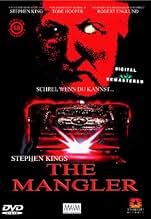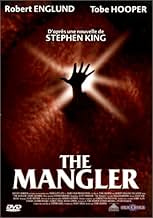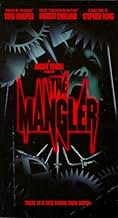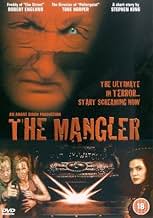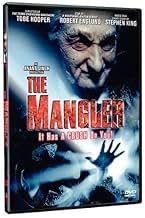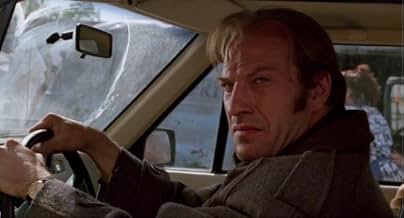IMDb रेटिंग
4.4/10
10 हज़ार
आपकी रेटिंग
अपनी भाषा में प्लॉट जोड़ेंA laundry-folding machine has been possessed by a demon, causing it to develop homicidal tendencies.A laundry-folding machine has been possessed by a demon, causing it to develop homicidal tendencies.A laundry-folding machine has been possessed by a demon, causing it to develop homicidal tendencies.
- पुरस्कार
- 1 जीत
कहानी
क्या आपको पता है
- ट्रिवियाJim Cummings, the voice of iconic characters such as Winnie the Pooh, Tigger, Darkwing Duck, Pete, Ed the Hyena, Ray the Firefly, Hondo Ohnaka, Dr. Robotnik and a variety of other animated characters, provided the vocal effects for the titular machine and was glad to get to work with director Tobe Hooper, whom he was a fan of, but felt that the strain put on his throat by making the Mangler noises and the quality of the film itself wasn't worth the effort. He once saw the film on television and was amused to see that his name was misspelled as 'Tim Cummings' in the end credits, as it meant that he got paid to do a bad film and no one would even know he had been involved.
- गूफ़Mark incorrectly refers to a time in New England when witches were burned. This was actually a death sentence during medieval times in Europe, when someone was convicted of witchcraft. Colonial witch trials carried out the death sentence by hanging.
- भाव
Mark Jackson: Whats in this?
Officer John Hunton: I don't know, they're antacids, I got them from Mrs. Frawley.
Mark Jackson: [looking at ingredients on antacid bottle] Belladonna? You got these from Mrs. Frawley?
Officer John Hunton: The Hand of Glory?
Mark Jackson: I think... we may be fucked.
- इसके अलावा अन्य वर्जनAvailable in an R-rated version and an Unrated "director's cut". The unrated version contains very graphic versions of scenes, including Mrs. Frawley's and Gartley's deaths.
- कनेक्शनFeatured in The Adventures of Sebastian Cole (1998)
फीचर्ड रिव्यू
I'm one of those who believe that Stephen King owes a very large debt of gratitude to H.P. Lovecraft (1890-1937.) In all fairness to King, though, he has graciously acknowledged Lovecraft's many important contributions to literary horror.
It's possible that director Tobe Hooper also recognized Lovecraft's significance when adapting The Mangler for the big screen. The short-story version does not offer a substantive historical link between the present-day and the genesis of the demon machine in the 1920s; the decade when Lovecraft began his short but illustrious writing career. Hooper took great pains, however, to develop an atmosphere that evokes the New England of Lovecraft's youth; a period when mill towns offered the only refuge for immigrants and native poor unable to make a living off the land. It was a time before the New Deal social reforms of President Franklin Roosevelt offered some relief from the exploitative and dangerous conditions inflicted on America's working class. For me, the philosophical sub-text of The Mangler is the evils of unbridled, industrial capitalism. The fact that rural communities have often depended for their very existence on a dehumanizing local industry is not lost on the socially progressive King.
Some have characterized The Mangler as an outstanding B-movie. I prefer to regard it as an all around entertaining flick. Although such films tend to be formulaic, Hooper and co-screenwriter Stephen David Brooks deserve credit for fleshing-out King's short story in a laudable fashion. The film's characters are well developed, and Robert Englund's portrayal of Bill Gartley, the grotesquely maimed, delightfully evil owner of the laundry machine from hell, should have earned him an Oscar nomination for Best Supporting Actor (a nod that should also have gone to Fred Gwynne for his fine work in Pet Sematary.) Ted Levine, and the versatile Jeremy Crutchley -- who portrayed two different characters in The Mangler -- also turned in noteworthy performances. Last but not least, the film's surprise ending, totally different from the climax of the original short story, is satisfying and appropriate.
Despite the overwhelming popularity of his novels, I believe that King's lesser works best demonstrate his creative gifts. The short story format demands an economy of words and a disciplined approach that can result in high emotional impact for readers. Short stories also provide additional latitude for movie makers to offer their unique interpretation of the work. The film adaptation of The Mangler is a fine example of the creative synergy between literary and cinematic artists, and a must-see for horror fans.
It's possible that director Tobe Hooper also recognized Lovecraft's significance when adapting The Mangler for the big screen. The short-story version does not offer a substantive historical link between the present-day and the genesis of the demon machine in the 1920s; the decade when Lovecraft began his short but illustrious writing career. Hooper took great pains, however, to develop an atmosphere that evokes the New England of Lovecraft's youth; a period when mill towns offered the only refuge for immigrants and native poor unable to make a living off the land. It was a time before the New Deal social reforms of President Franklin Roosevelt offered some relief from the exploitative and dangerous conditions inflicted on America's working class. For me, the philosophical sub-text of The Mangler is the evils of unbridled, industrial capitalism. The fact that rural communities have often depended for their very existence on a dehumanizing local industry is not lost on the socially progressive King.
Some have characterized The Mangler as an outstanding B-movie. I prefer to regard it as an all around entertaining flick. Although such films tend to be formulaic, Hooper and co-screenwriter Stephen David Brooks deserve credit for fleshing-out King's short story in a laudable fashion. The film's characters are well developed, and Robert Englund's portrayal of Bill Gartley, the grotesquely maimed, delightfully evil owner of the laundry machine from hell, should have earned him an Oscar nomination for Best Supporting Actor (a nod that should also have gone to Fred Gwynne for his fine work in Pet Sematary.) Ted Levine, and the versatile Jeremy Crutchley -- who portrayed two different characters in The Mangler -- also turned in noteworthy performances. Last but not least, the film's surprise ending, totally different from the climax of the original short story, is satisfying and appropriate.
Despite the overwhelming popularity of his novels, I believe that King's lesser works best demonstrate his creative gifts. The short story format demands an economy of words and a disciplined approach that can result in high emotional impact for readers. Short stories also provide additional latitude for movie makers to offer their unique interpretation of the work. The film adaptation of The Mangler is a fine example of the creative synergy between literary and cinematic artists, and a must-see for horror fans.
टॉप पसंद
रेटिंग देने के लिए साइन-इन करें और वैयक्तिकृत सुझावों के लिए वॉचलिस्ट करें
विवरण
- रिलीज़ की तारीख़
- कंट्री ऑफ़ ओरिजिन
- आधिकारिक साइट
- भाषा
- इस रूप में भी जाना जाता है
- Mengene
- फ़िल्माने की जगहें
- उत्पादन कंपनियां
- IMDbPro पर और कंपनी क्रेडिट देखें
बॉक्स ऑफ़िस
- US और कनाडा में सकल
- $17,81,383
- US और कनाडा में पहले सप्ताह में कुल कमाई
- $9,33,809
- 5 मार्च 1995
- दुनिया भर में सकल
- $17,81,383
- चलने की अवधि1 घंटा 46 मिनट
- रंग
- ध्वनि मिश्रण
- पक्ष अनुपात
- 1.85 : 1
इस पेज में योगदान दें
किसी बदलाव का सुझाव दें या अनुपलब्ध कॉन्टेंट जोड़ें




